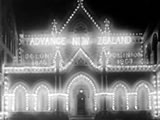What happened that day?
See historic events for any day of the year by entering the date below. Why not try your birthday?
Kiwi of the Week
Today in History

1907 Joseph Ward proclaims dominion status
From the steps of the General Assembly Library in Wellington, the prime minister read the proclamation to the gathered crowd. This first Dominion Day was a full public holiday.
As the Dominion’s capital, Wellington put on a big show all day and into the evening on 26 September. At mid-morning, a Guard of Honour marched from the Mount Cook Barracks to Parliament House as the 25-member Garrison Band played lively marching tunes.
At 11 a.m. the Governor, Lord Plunket, invited Prime Minister Sir Joseph Ward to read the proclamation of dominion status. Ward did so, then shouted out, ‘Three cheers for the King’. This was followed by cheers for the Governor, for Ward, and for the new Dominion of New Zealand.
The military and school cadets paraded, and Maori performed a haka. It was all over in just 15 minutes. The smallish crowd then set off for Newtown Park to watch a military review featuring 1600 men. The Governor inspected the troops and more speeches were made. The dignitaries then lunched at Government House.
Ward also issued a message to the people of New Zealand. He spoke of preserving ‘the purity of your race’ and urged ‘equal opportunity to all’. ‘Trust the future of our Dominion not to increasing wealth, but rather to an ever higher manhood and womanhood, to a wider enlightenment and humanity disciplined by the needs of industry, by temperate living, and by those healthy and beneficent tasks that beget advancement and which should be the price of promotion in a free country.’
That evening, Parliament adjourned early so the politicians could enjoy an oyster supper. Parliament Buildings put on a grand show. What is now the Parliamentary Library shone like a beacon. Bright lights across the front of the building spelt out ‘Advance New Zealand’ and the words ‘Colony 1840’ and ‘Dominion 1907’.
Image: Parliament Buildings lit up on Dominion Day, 1907
Internal links

1865 Native Rights Act declares Maori British subjects
The Act deemed all Maori to be natural-born subjects of the Crown, confirming in law the Treaty promise that Maori were to be accorded the same rights and privileges as other British subjects.
Under Article Three of the Treaty of Waitangi Maori gained ‘all the Rights and Privileges of British Subjects’. When the position of Maori was challenged because of their ‘non-British’ (communal) form of land tenure, their status as British subjects was confirmed by the Native Rights Act 1865.














